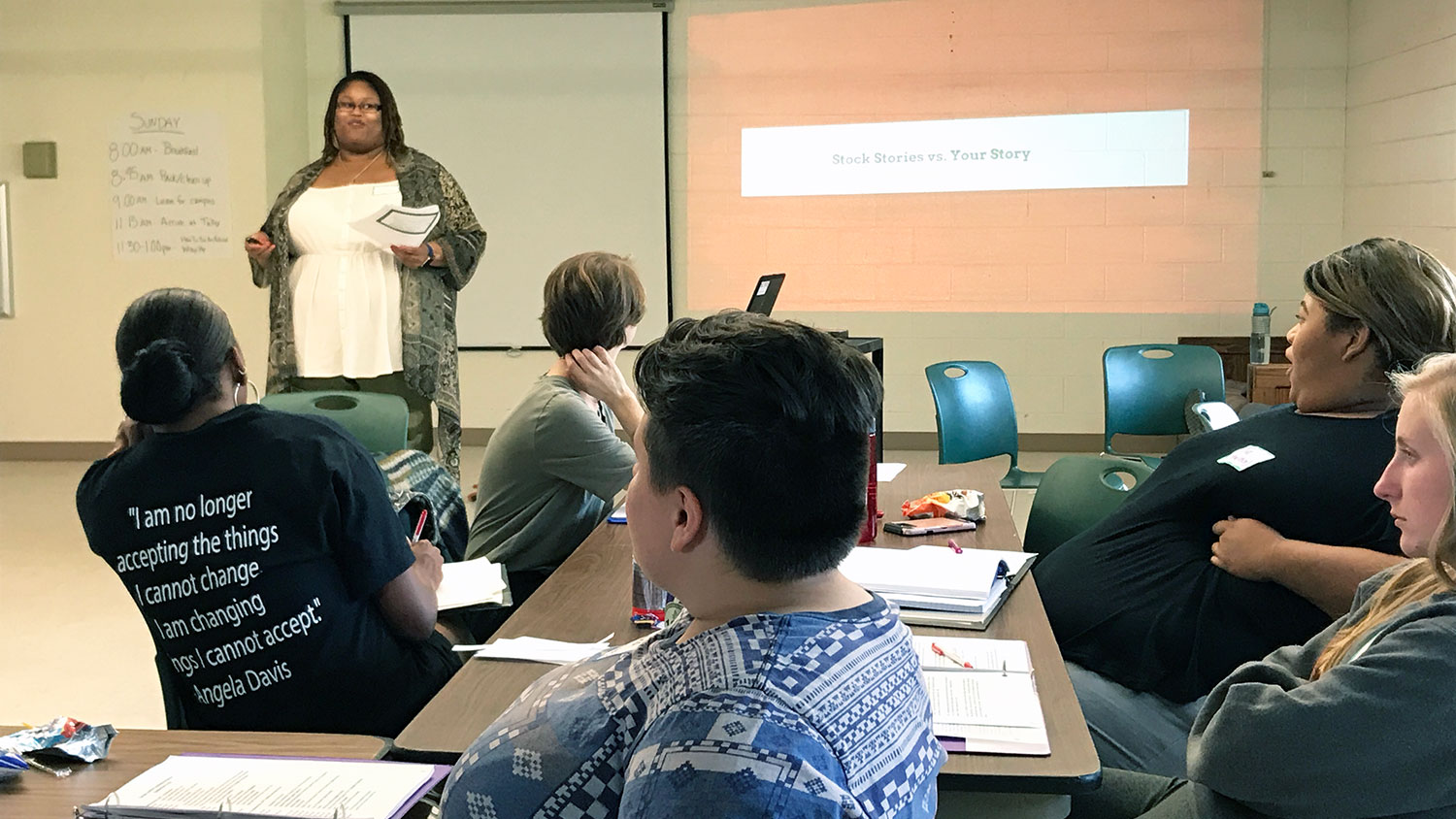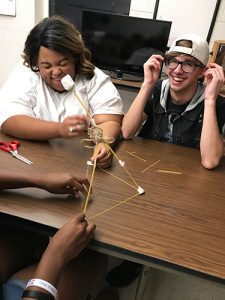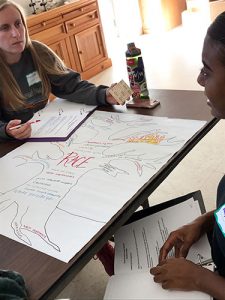Social Justice Leadership Retreat Builds Advocates

The first Social Justice Leadership Retreat (SJLR), made possible by an Office for Institutional Equity and Diversity (OIED) Diversity Mini-Grant, had its 2.5-day intensive off-campus excursion from Friday, September 8 to Sunday, September 10, 2017. Led by the Center for Student Leadership, Ethics, and Public Service (CSLEPS), thirteen undergraduate and graduate students spent their weekend diving into social justice training that went beyond surface-level conversations and broadening their knowledge and awareness of intersectional oppression, power and privilege.
 An Introduction to Social Justice Education
An Introduction to Social Justice Education
In May 2017, the SJLR Orientation introduced participants to the unique analysis and goals of social justice education, the levels on which oppression operates and the intersectional lens through which they would look to build action in a particular focus area. During summer 2017, participants read Between the World and Me (NC State’s 2017 common reading selection) practiced engaging in conversations around social justice issues with different people and surveyed narratives present in the media. Shortly after the start of the semester, participants came together again to share about their summer learning, process the deep themes in the common reading and learn more about their own and others’ identities using activities from the National Coalition Building Institute.
Inspired in part by applicant responses to the question “What are the most pressing issues you see facing our campus/community?” as well as current events such as the Deferred Action for Childhood Arrivals (DACA) rally that took place immediately prior to departure, the SJLR participants chose to break into three groups to focus on racism, GLBT oppression and xenophobia (in this case, the oppression of those perceived to be not from or not part of the United States). These focus groups allowed participants to feel grounded in an issue as they explored the intersections with other overlapping forms of oppression.
Experiences Highlighting the Impact of Oppression
 The retreat curriculum was structured to walk the participants through a variety of experiences that highlighted the historic and institutional impact of oppression, the often parallel instances of student resistance and activism and strategies for creating social change for social justice issues today. “I thought it was a great experience! I enjoyed getting to meet others with the same activist mindset as myself, and the information that was presented was fascinating. I can’t say I’ve spent much time delving into the history of activism, but learning about it and knowing that there have been centuries of activists before me invigorated me,” said Manasa Chitluri. Participants unpacked the false and stock narratives that surround each part of one’s identity, and they experienced what it felt like to craft and share their own counterstory to combat the oppression inherent in stock stories. This experience created a deeper sense of partnership and community from which the participants could organize for a collective impact. In fact, inspired by the retreat sessions on Saturday afternoon, the participants spent their free time that evening crafting the beginnings of an intersectional collaborative event for campus student organizations to build alliances and show solidarity for marginalized and minoritized identities. “One of the main things I enjoyed was how we got to know each other and that the last night of the retreat we took the skills we learned and are in the process of creating an event/rally focused on intersectionality and inclusion,” said Tia Canada.
The retreat curriculum was structured to walk the participants through a variety of experiences that highlighted the historic and institutional impact of oppression, the often parallel instances of student resistance and activism and strategies for creating social change for social justice issues today. “I thought it was a great experience! I enjoyed getting to meet others with the same activist mindset as myself, and the information that was presented was fascinating. I can’t say I’ve spent much time delving into the history of activism, but learning about it and knowing that there have been centuries of activists before me invigorated me,” said Manasa Chitluri. Participants unpacked the false and stock narratives that surround each part of one’s identity, and they experienced what it felt like to craft and share their own counterstory to combat the oppression inherent in stock stories. This experience created a deeper sense of partnership and community from which the participants could organize for a collective impact. In fact, inspired by the retreat sessions on Saturday afternoon, the participants spent their free time that evening crafting the beginnings of an intersectional collaborative event for campus student organizations to build alliances and show solidarity for marginalized and minoritized identities. “One of the main things I enjoyed was how we got to know each other and that the last night of the retreat we took the skills we learned and are in the process of creating an event/rally focused on intersectionality and inclusion,” said Tia Canada.
Future Planning
Due to the uncertainty of Hurricane Irma’s path, the retreat was cut short to prioritize the safety of participants and facilitators; however, the first SJLR cohort will meet on October 17, 2017 to continue the conversation with guided action planning and coalition-building sessions. These activities will help them further refine their plans for advancing social justice on campus and connect their current work to the bigger picture of other advocacy efforts.
Andy DeRoin is program coordinator in the GLBT Center.
Save
Save
Save
- Categories:


